| “I marvel, though, at Heydt-Stevenson’s boldness in speaking of Austen’s ‘meanings.’ If we are forbidden [in this post-modern age] to say that an author ‘means,’ even if she [the author] protests that she really means it, can we use dictionaries [of bawdy Georgian slang] and theoretical apparatus to infer a meaning, and then impute it back to the author as a conscious insertion? Just asking.” -- Peter Knox-Shaw, book review of Unbecoming Conjunctions |
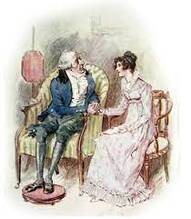 Mr. Woodhouse and Isabella
Mr. Woodhouse and Isabella Heydt-Stevenson's upside-down interpretation of Austen means, for example, that Mr. Woodhouse is not a gently selfish invalid, but a pervert who wants to remember the words to a disgusting riddle so he can recite it to his virginal daughter and her virginal friend. Heydt Stevenson theorizes: “Mr. Woodhouse might have been a libertine in his youth and now suffers from tertiary syphilis."
Heydt-Stevenson’s evidence for this is Mr. Woodhouse's poor health and his fondness for a nice warm fire and some thin gruel. She overlooks anything he says, or anything people say about him, that doesn't fit her thesis...
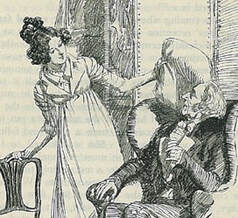 Not about to smother him with that pillow
Not about to smother him with that pillow But Mr. Woodhouse is not presented as a raddled old roué in Emma. Everything he says, and everything we're told about him, gives us a portrait of a man who is courteous to ladies rather than cynical, home-loving rather than a party animal, and naïve rather than world-weary. He doesn't have gout (a common symptom of overindulgence), he doesn't utter any coarse expressions or make any salacious remarks.
The foundation and starting-point for Heydt-Stevenson's interpretation of Emma is the riddle "Kitty, a fair but frozen maid," partly quoted by Mr. Woodhouse. As I explain in my article in Persuasions online, I believe the riddle is not bawdy at all, it's just that its language carries a different connotation today than it did back in the long 18th century. This whole thing about the Kitty riddle being about syphilis is just a big misunderstanding, in my view, and modern academia has picked up this erroneous notion and run with it.
| "The name [Kitty] makes me think of poor Isabella [Emma's older sister]; for she was very near being christened Catherine after her grandmama. I hope we shall have her here next week. Have you thought, my dear, where you shall put her—and what room there will be for the children?” “Oh! yes—she will have her own room, of course;" [Emma answers] the room she always has;—and there is the nursery for the children,—just as usual, you know. Why should there be any change?” |
Austen is using Mr. Woodhouse's anxious worries about nothing and Emma's reassuring replies for exposition. Isabella and her husband and the kids are coming. This is a skilful author at work, illustrating character while at the same time giving us necessary information. Do English teachers point out this writing mastery to their students? From what I can tell, they are too busy talking about how Austen wanted to dismantle the patriarchy.
Is Isabella held up being as a prisoner of her marriage because she prefers to return to London rather than stay behind in Hartfield for a while? This is how Mr. Woodhouse sees her, but let's see what the narrator says about that:
| Mr. Woodhouse having, as usual, tried to persuade his daughter to stay behind with all her children, was obliged to see the whole party set off, and return to his lamentations over the destiny of poor Isabella;—which poor Isabella, passing her life with those she doated on, full of their merits, blind to their faults, and always innocently busy, might have been a model of right feminine happiness. |
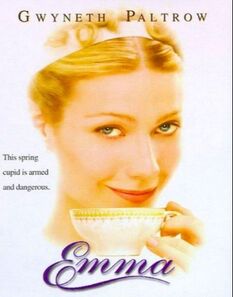
Without such tendentious readings, I don't see any textual evidence for Heydt-Stevenson's assertions that the message of Emma is that marriage is like prostitution--this, in a novel which ties with Pride & Prejudice for the number of weddings (four). Who is the character in the book who is opposed to matrimony? Mr. Woodhouse. Is he the moral arbiter of the novel, that is, does anyone look up to him for guidance or advice? No, quite the opposite in fact. Is Mr. Woodhouse opposed to marriage because it's like prostitution? No. He's opposed to having anyone he loves, leave him because of his "habits of gentle selfishness." In this respect he is an obstacle to Emma's marriage, which in other novels of the long 19th century would make him a villain, a tyrannical father.
But Emma is shown as being tender, patient and considerate with her father, unfailingly so, and unlike Anne Elliot or Elizabeth Bennet, there is no authorial aside to tell us that the daughter is fully conscious of her father's faults. Yes, we are told that Mr. Woodhouse could not meet Emma in conversation, either rational or playful, but nothing in that suggests moral shortcomings. For Anne Elliot, marriage is a blessed release from her father's roof, but Emma weeps over the idea of leaving her father "as a sin of thought" when Mr. Knightley proposes marriage.
Matrimony, far from restricting Emma, will bring her a greater degree of freedom and authority, especially after she buries her father. She will finally be able to travel, and she will spend her days with an intelligent companion, and she'll be the mistress of both Hartfield and Donwell Abbey, making her unquestionably the first lady of the village.
So where is the critical portrayal of matrimony? Where are the hints in the text that Austen is anti-marriage? Heydt-Stevenson says Emma contains "a marked emphasis on heat and cold and on figures of Cupids and chimneys,” all of which will refer the reader's mind back to the Kitty riddle, which will remind them in turn that marriage is like prostitution. A marked emphasis on heat and cold in a novel spanning four seasons in a 19th century English village does not surprise me. I also don't see a marked emphasis on "figures of Cupid" because the word "Cupid" does not appear in the book. "Figure-pieces" appears as a reference to some drawings Emma's made for Mrs. Weston. Robert Martin brings "his shepherd’s son into the parlour one night on purpose to sing" to Harriet, but a shepherd boy is a figure more like Pan than Cupid. Emma, of course, plays Cupid, and she gets married and her union, we are told, is perfectly happy.
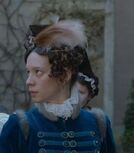 Chloe Pirrie as Isabella in Emma 2000 Chloe Pirrie as Isabella in Emma 2000 Director Autumn de Wilde decided to swap out Austen's good-natured Isabella for a bitchy control freak in the 2000 movie version of Emma. Maybe that's more relatable for a modern audience than a woman who uncritically adores her husband. Confession: I kind of like John Knightley, grump though he is. More on the riddle "Kitty, a fair but frozen maid" and 18th century love poetry. My research into the riddle "Kitty, a fair but frozen maid," is published in the JASNA online journal Persuasions. |
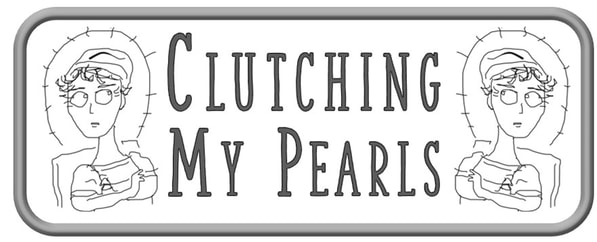
 RSS Feed
RSS Feed